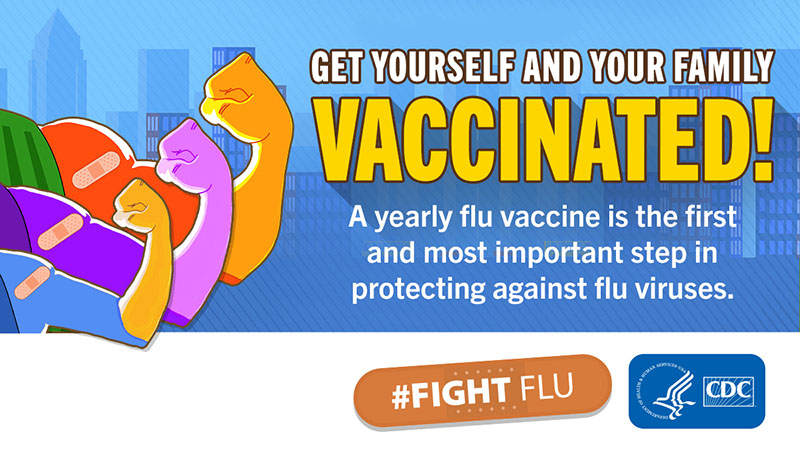
by Rabiah Ali, MD, Internal Medicine, Senior Care Clinic
With the COVID-19 pandemic colliding with flu season, it’s more important than ever to receive the flu vaccine as soon as possible.
Why is getting a flu shot this year particularly important? The flu vaccine prevents millions of illnesses and flu-related doctor’s visits each year. By getting vaccinated, not only will you reduce your risk of influenza, but also help conserve potentially scarce healthcare resources, especially as COVID-19 will be spreading at the same time. During the 2018-2019 season, the flu was responsible for an estimated 490,600 hospitalizations and 34,200 deaths, according to the CDC. Hospitals cannot afford the additional strain on equipment if there’s a competition for beds this season, when COVID-19 and the flu collide like tidal waves. The Centers for Disease Control recommend that all people 6 months and older get a yearly flu vaccine. Each of you have the chance to make a positive impact on our community’s health by receiving the flu vaccine.
Which patients are at higher risk for complications if they get the flu? Per the CDC, people over the age of 65, pregnant women, young children, people with history of asthma, heart attack/stoke, diabetes, HIV/AIDs, or cancer are at higher risk.
What is the high-dose flu shot and who should get this? The quadrivalent high dose flu vaccine is recommended for adults 65 years and older. Compared to the standard flu vaccine, the high dose contains four times the antigen, which is the part of the vaccine that helps your body build protection against the flu. The higher antigen dose is intended to give older people a better immune response and better protection against the flu.
Why do we need to get a new flu shot every year? Your immune protection from the flu vaccine weakens over time and due to changes of the virus, you must be vaccinated every year. The flu vaccine is based on the most common circulating strains of influenza—the better the match between the vaccine and circulating strains, the more benefit in terms of reducing illness.
Is the flu vaccine effective at protecting flu patients from severe respiratory failure?
For years, the flu vaccine has proven to be effective. An October 2017 study published in the journal Clinical Infectious Diseases found that flu shots reduced ICU admissions, the overall duration of hospitalization and deaths. Even though the flu vaccine is between 40 percent and 60 percent effective, according to the CDC, the vaccine reduces the severity of illness in people who contract the flu. In other words, the vaccine has potential to protect flu patients from severe respiratory failure.
Can people get the flu and COVID-19 at the same time? Yes, it is possible to get the flu, as well as other respiratory illnesses, including COVID-19, at the same time. If you contract COVID-19 and the flu simultaneously, or one after the other, that could translate into worsened respiratory health long-term. Your overall ability to recover would be compromised.
Will the flu vaccine protect against COVID-19? Getting the flu vaccine will not protect against COVID-19. However, getting a flu vaccine this year will be more important than ever as it is likely that the flu virus and the virus causing COVID-19 will both be spreading.Valley Medical Center is aiming to administer 55,000 flu vaccines by October 31.
What are the possible side effects of flu vaccination? Possible side effects include soreness, redness or swelling at the site of the injection, low-grade fever and achiness. These tend to be minor and last only 1-2 days.
Take action and get you and your family vaccinated for flu.
Valley’s healthcare team dedicates their lives to keeping everyone safe, especially now, when we are all living through a global pandemic. Help us reach our goal of 55,000 vaccines by Halloween. Stay safe and make the right decision: get vaccinated this fall.
Rabiah Ali, MD practices at Valley’s Senior Care Clinic in Renton. She is passionate about working with the geriatric population, specifically in regard to quality of life, preventive care, and other geriatric issues. She is board-certified in internal medicine and geriatrics.
Dr. Ali grew up in South Carolina, and after graduating from University of South Carolina, she received her medical degree from Ross University School of Medicine. She completed her internal medicine residency in Wilmington, NC and completed her geriatric medicine fellowship at Emory University in Atlanta, GA. In her spare time, Dr. Ali enjoys spending time with friends/family, hiking, cooking, and trying new foods.

